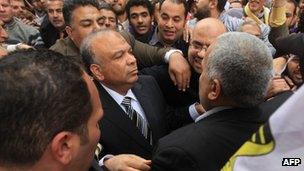Egypt's new assembly elects Muslim Brotherhood speaker
- Published
The BBC's Jon Leyne says it is "a truly historic moment" for Egypt
Egypt's new parliament has elected a speaker from the Muslim Brotherhood, the Islamist movement whose Freedom and Justice Party won recent elections.
Mohammed Saad al-Katatni was chosen by a large majority of MPs at the inaugural session of the lower chamber, the People's Assembly.
It was the first meeting of the assembly since the uprising last February that forced former President Hosni Mubarak from power.
Mr Mubarak is currently on trial.
Mr Katatni was backed by 399 out of 503 MPs, state media say.
"This parliament bears a heavy burden, because it must achieve the people's ambitions," he told Nile News TV before the session began.
"I believe that this parliament will in its first session reach agreement on the rights of martyrs, the injured as well as the poor, who were marginalised under the former regime."

Mohammed Saad al-Katatni was mobbed by supporters on the way into parliament
Islamists dominated the elections held for the People's Assembly over the past three months, winning 73% of the seats.
The Muslim Brotherhood's Freedom and Justice Party won 235 seats, the ultra-conservative Salafist Nour Party 121 and the moderate al-Wasat Party 10.
First session
Monday's session was chaired by Mahmoud al-Saqqa of the liberal New Wafd party, who at 81 is the oldest member of the assembly.
He began proceedings by ordering a moment of silence for the 850 people who were killed during the 18-day uprising against Mr Mubarak.
The former leader has been accused of ordering the security forces to shoot protesters during last year's mass protests against his rule.
He could face the death penalty if convicted at his trial in Cairo.
The assembly's inaugural session became briefly chaotic when several MPs made impromptu additions to the text of the oath they were taking, provoking angry calls to order from Mr Saqqa.
The oath ends with a pledge to respect the constitution and law, but one Islamist added "God's law", while two pro-reform MPs promised to "complete the 25 January revolution" and to respect "the rights of its martyrs".
Several independent MPs and others from liberal and secular groups also wore yellow sashes saying: "No to military trials for civilians."
At least 12,000 people have faced military tribunals since the Supreme Council for the Armed Forces assumed the president's powers.
New constitution
Held over three phases between 28 November and 11 January, the parliamentary elections were considered the freest in Egyptian history.
The People's Assembly's priority is to select a 100-member panel to draft a new constitution that will be put to a referendum before a presidential election in June, when the ruling generals are scheduled to step down.
The BBC's Jon Leyne in Cairo says liberals fear the Muslim Brotherhood and the ruling military council will find a way to share power.
They believe the military may be allowed to maintain its privileges and perhaps be given a veto of a foreign and defence policy, while the Brotherhood may secure greater control over Egyptian society, our correspondent adds.
Liberal and secular parties polled badly, with the New Wafd securing 38 seats, the Egyptian bloc 34 and the Reform and Development Party nine.
The Revolution Continues, a group formed by youth activists behind the uprising that ousted Mr Mubarak, won only seven seats.
The Muslim Brotherhood's leader, Mohammed Badie, said in December the Freedom and Justice Party would form a broad coalition if it won the elections.